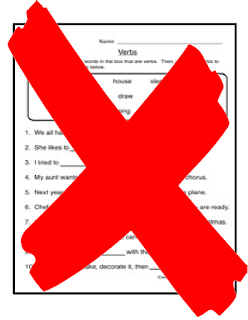We are a group of 5th grade teachers who are reading and blogging together. Thanks so much for joining us as we read and discuss Readicide. Please leave a comment and let us know your thoughts.
Chapter 3, Avoiding the Tsunami
Readicide Factor: The Over Analysis of Books Creates
Instruction That Values the Trivial at the Expense of the Meaningful.
Wow! Imagine that. Great teachers are contributing to
readicide! Here’s the recipe:
The Kill-a-Reader
Casserole
*Take one large Novel. Dice into as many pieces as possible.
*Douse with sticky notes.
*Remove book from the oven every 5 minutes and insert
worksheets
*Add more sticky notes
*Baste until novel is unrecognizable, far beyond well done.
*Serve in choppy bite-size chunks.
Yes, I am guilty. But over the years I have adjusted and
found a balance. I changed the way I was teaching because the students did not
like reading novel. What? How come? I was teaching the novel the same way I was
taught when I was in middle school and high school. Insert “Ah Ha” moment. I
hated every single novel I read in school. Why? Because the teachers used the
above recipe.
Now I do more pre-reading
activities to cover things like vocab, dialect, and any background knowledge
that the students need. I use the first couple of chapters to work on the
basics of character, setting, theme, cause & effect, etc, etc. and then we
read. Yes we do sometimes stop and discuss and I might throw in a fun activity,
but most of the activities take place after we have read the book. We sometimes
go back and reread a section or page. But I am not disrupting the flow. My students
really love the novels now (even the ones I hated as a child).
As we discuss the novels the class somehow always hits on
the value of each novel on their own. I am always ready to steer them in a
certain direction but rarely need to. As an example we read Sign of the Beaver, the class will bring up the differences in culture and how
the Native Americans were treated. I have never needed to bring that up. So by
letting them read and enjoy the book it seems that they are able to pick out
the valuable lessons. As an educator you know I am bursting with pride when
this happens.
Now what do you do with all of the huge, super comprehensive
novel study unit that you bought? Total waste of money? No, I still use them. Not
every piece every year and I use them in the beginning and at the end. The
middle is for reading. I find that we use different worksheets and activities
each year. I know my class, what they need, and what will they enjoy? Different
groups just need different things. So even though I do not use the whole unit
over the course of time I have used most pieces.
Hop on over to The Big Kids Hall and see what she has to say
about Readicide.
Interested in joining in? Here's our schedule.
We'd love to know what you think.
















